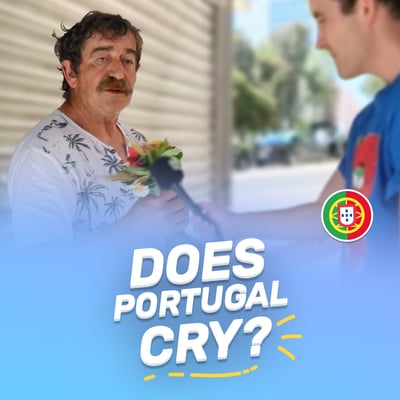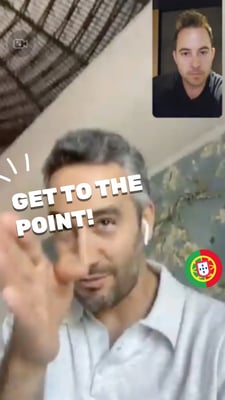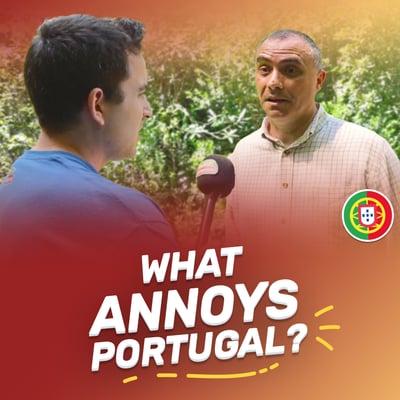1
00:00:00,042 –> 00:00:04,417
R: Olhe, diga-me uma coisa por curiosidade. Nós temos reparado que aqui no norte
{{R: Tell me something, out of curiosity. We’ve noticed that here in the north}}
2
00:00:04,417 –> 00:00:07,833
deixa-se o pão assim na porta das casas.
{{people leave bread on their doorsteps like this.}}
3
00:00:07,833 –> 00:00:12,042
Sr: É o padeiro que passa. Passa cedo, sabe?
{{Sir: It’s the baker who passes by. He comes early, you know?}}
4
00:00:12,042 –> 00:00:18,917
E deixa o pão e depois a gente, quando se puser a pé, já vê o pão à porta…
{{And he leaves the bread and then when people get up, they already have it at the door…}}
5
00:00:18,917 –> 00:00:21,417
R: Ah, é para não acordar as pessoas. É isso.
{{R: Ah, it’s to avoid waking people up. That’s it.}}
6
00:00:21,417 –> 00:00:27,708
Sr: E mesmo que esteja a pé, a gente já sabe o que tem e ninguém rouba nada, sabe?
{{Sir: And even if we’re already up, we know what’s ours and no one steals anything, you know?}}
7
00:00:27,708 –> 00:00:30,500
R: Pois, e é porque a padaria é longe, não é?
{{R: Right, and this is because the bakery is far away, isn’t it?}}
8
00:00:30,500 –> 00:00:33,917
Sr: É transporte de veículos, de carro.
{{Sir: It’s transported by vehicles, by car.}}
9
00:00:33,917 –> 00:00:35,542
R: Ah, ele vai de porta a porta.
{{R: Ah, he goes door to door.}}
10
00:00:35,542 –> 00:00:36,917
Sr: De porta a porta.
{{Sir: Door to door.}}
11
00:00:36,917 –> 00:00:39,250
R: Ah, e as farmácias também fazem esse serviço ou é só o pão?
{{R: Ah, and pharmacies also provide that service or just the bakery?}}
12
00:00:39,250 –> 00:00:42,250
Sr: Não, aqui farmácia não. A farmácia é só na vila.
{{Sir: No, no pharmacies here. The pharmacy is only in town.}}
13
00:00:42,250 –> 00:00:44,042
Só em Ponte de Lima.
{{Only in Ponte de Lima.}}
14
00:00:44,292 –> 00:00:45,167
R: Está bem, obrigado!
{{R: All right, thank you!}}
15
00:00:45,167 –> 00:00:46,833
Sr: Tem que se ir à farmácia. Boa viagem.
{{Sir: People have to go to the pharmacy. Have a nice trip.}}
16
00:00:46,833 –> 00:00:47,917
J: Obrigado!
{{J: Thank you!}}
17
00:00:49,667 –> 00:00:54,917
R: Reparámos que [em] muitas casas, um dos lados da casa tem janelas normais em cima
{{R: We noticed that, in several houses, one of the sides has regular windows on top}}
18
00:00:54,917 –> 00:00:57,625
e depois, em baixo, tem só assim um retângulo.
{{and then just a little rectangle below.}}
19
00:00:58,500 –> 00:01:03,292
Sra: Antigamente, as casas, a parte de cima era moradia para a gente morar
{{Lady: In the past, the upper part of the houses was for people to live in}}
20
00:01:03,292 –> 00:01:10,125
e os fundos eram para estábulos dos animais, adega e essas coisas.
{{and the bottom was for animal stables, cellars and things like that.}}
21
00:01:10,125 –> 00:01:12,208
E nesses sítios, faziam umas janelinhas pequeninas.
{{And in those places, they’d install some tiny windows.}}
22
00:01:12,208 –> 00:01:13,625
R: Então, não era preciso tanta luz.
{{R: So, not much light was needed.}}
23
00:01:13,625 –> 00:01:16,792
Sra: Não precisavam de tanta luz e a haver a adega, também não precisava de luz,
{{Lady: It didn’t require that much light, and if there was a cellar, it also didn’t need light,}}
24
00:01:16,792 –> 00:01:18,000
que também é melhor não ter luz…
{{because it’s also better not to have any…}}
25
00:01:18,000 –> 00:01:18,833
R: Claro.
{{R: Of course.}}
26
00:01:18,833 –> 00:01:19,958
Sra: E é por isso que a parte…
{{Lady: And that’s why the bottom…}}
27
00:01:19,958 –> 00:01:21,042
J: Fica mais fresco, não é?
{{J: It stays cooler, right?}}
28
00:01:21,042 –> 00:01:25,333
Sra: As casas antigas, os fundos eram para aproveitamento de…
{{Lady: In old houses, the bottom half was for…}}
29
00:01:25,333 –> 00:01:29,292
Para os estábulos dos animais, tinham animais… Agora já se não muda.
{{For animal stables, they had animals… Now it doesn’t change.}}
30
00:01:29,292 –> 00:01:32,750
Já fizeram, já alteraram muitas casas, já fizeram novamente…
{{They’ve already built them, they’ve already changed many houses, rebuilt…}}
31
00:01:32,750 –> 00:01:35,917
R: Janelas. E o que são aquelas coisas assim em bico com palha?
{{R: Windows. And what are those pointy things like this, with straw?}}
32
00:01:35,917 –> 00:01:39,292
Que se vê assim, parece um chapéu em bico cheio de palha.
{{They look like this, it’s like a pointy hat full of straw.}}
33
00:01:40,250 –> 00:01:46,500
Sra: Continuando, a maneira de armazenar a palha… A palha é restos do milho.
{{Lady: Continuing on… the way to store straw… Straw is a corn byproduct..}}
34
00:01:46,500 –> 00:01:51,042
Tiram a maçaroca e depois aquela parte fica para alimentação dos animais.
{{They take out the corncob and that part is left behind to feed livestock.}}
35
00:01:51,292 –> 00:01:54,125
E aquilo é a maneira de armazenar e de passar o inverno,
{{And that’s a way to store it over winter,}}
36
00:01:54,125 –> 00:01:56,625
para as pessoas terem para durante o inverno, quando o tempo está de chuva…
{{so people can have it during winter, when there’s rainy weather…}}
37
00:01:56,625 –> 00:01:57,417
R: Armazena-se assim.
{{R: It’s stored like that.}}
38
00:01:57,417 –> 00:02:00,583
Sra: Armazena-se assim e depois vão lá buscar consoante o animal precisa para comer.
{{Lady: It’s stored like that and then they pick it up according to the animals’ feeding needs.}}
39
00:02:00,583 –> 00:02:01,250
R: Boa.
{{R: Nice.}}
40
00:02:01,250 –> 00:02:02,000
J: Obrigado!
{{J: Thank you!}}
41
00:02:02,000 –> 00:02:03,042
R: Entenderam?
{{R: Did you all understand?}}
42
00:02:03,042 –> 00:02:04,708
Sra: Olhe… Eu estive a gravar e tudo.
{{Lady: Look… I was being filmed and everything.}}
43
00:02:10,792 –> 00:02:11,500
Sr1: Bom dia!
{{Sir1: Good morning!}}
44
00:02:11,500 –> 00:02:12,583
R: Bom dia.
{{R: Good morning.}}
45
00:02:12,917 –> 00:02:15,708
Não queria estar a incomodar o senhor.
{{I didn’t want to bother you, sir.}}
46
00:02:15,708 –> 00:02:17,458
Sr1: Podem se sentar um bocadinho, se quiserem.
{{Sir1: You can sit for a while, if you want.}}
47
00:02:17,458 –> 00:02:19,125
Sr2: E um bom domingo para ti também!
{{Sir2: I wish you a nice Sunday too!}}
48
00:02:19,125 –> 00:02:20,625
Sr1: Bom domingo para ela, para a São!
{{Sir1: Wish a nice Sunday, to São!}}
49
00:02:20,625 –> 00:02:23,750
Sr2: Passa um bom domingo! Passa um bom domingo!
{{Sir2: Enjoy your Sunday! Enjoy your Sunday!}}
50
00:02:23,792 –> 00:02:25,208
‘Tchau’ menina, chau.
{{Goodbye, miss, bye.}}
51
00:02:25,208 –> 00:02:26,667
Sr1: Ainda é longe, é.
{{Sir1: Yes, it’s still far.}}
52
00:02:26,875 –> 00:02:28,958
J: Um bocadinho, até Santiago, sim.
{{J: Yes, it’s a bit far, until Santiago.}}
53
00:02:28,958 –> 00:02:30,208
Sr2: Cento e trinta quilómetros.
{{Sir2: 130 km.}}
54
00:02:30,208 –> 00:02:30,833
J: Ah é?
{{J: Ah, really?}}
55
00:02:30,833 –> 00:02:33,042
R: O senhor é moderno com o telemóvel!
{{R: You’re all modern with your cellphone!}}
56
00:02:33,292 –> 00:02:35,292
Sr2: Eu também sou moderno!
{{Sir2: I’m modern too!}}
57
00:02:35,375 –> 00:02:38,000
R: Vocês sabem assim algum dizer aqui da terra?
{{R: Do you know any sayings from this area?}}
58
00:02:38,000 –> 00:02:42,250
Sr1: Nós aqui na terra, temos… Labruja, Ponte de Lima,
{{Sir1: In this area, we’ve got… Labruja, Ponte de Lima,}}
59
00:02:42,250 –> 00:02:45,792
temos aqui o Mosteiro do Senhor do Socorro, que está em restauração,
{{there’s the Monastery of Senhor do Socorro, which is being restored,}}
60
00:02:46,000 –> 00:02:49,500
e tudo de bem, aqui estas zonas…
{{and all-around beauty, around here…}}
61
00:02:50,500 –> 00:02:52,875
Ponte de Lima, é o sarrabulho, é…
{{In Ponte de Lima, there’s ‘sarrabulho’, there’s…}}
62
00:02:52,875 –> 00:02:53,708
R: Ah, isso é um prato, não é?
{{R: Ah, that’s a dish, right?}}
63
00:02:53,708 –> 00:02:57,000
Sr1: O vinho verde… Fazem muita coisa boa.
{{Sir1: Green wine… They do lots of good things.}}
64
00:02:57,000 –> 00:02:58,458
Sr2: Depois, temos São João da Grova…
{{Sir2: Then, there’s São João da Grova…}}
65
00:02:58,458 –> 00:03:01,167
Sr1: São João da Grova, aqui mais à frente…
{{Sir1: São João da Grova, a bit further…}}
66
00:03:01,167 –> 00:03:07,583
Sr2: Foi uma… igreja. Depois da igreja, vieram…
{{Sir2: It used to be a… church. After the church, they…}}
67
00:03:07,583 –> 00:03:11,917
Veio para a igreja, depois vinham para baixo com os sinos.
{{Came to the church, then they’d come down with bells.}}
68
00:03:11,917 –> 00:03:13,458
Um carreteiro trazia os sinos…
{{A carter would bring the bells…}}
69
00:03:13,750 –> 00:03:19,083
R: E uma palavra que só se use aqui nesta região? Há alguma palavra aqui mais típica?
{{R: What about a word that’s only used in this region? Any word that’s more typical?}}
70
00:03:19,083 –> 00:03:21,500
Ali em Rates, ensinaram-nos cachopa.
{{In Rates, we were taught ‘cachopa’.}}
71
00:03:21,500 –> 00:03:22,708
Sr1: Ai, cachopa.
{{Sir1: Ah, ‘cachopa’.}}
72
00:03:22,708 –> 00:03:25,208
Sr2: Cachopa. Cachopa é uma rapariga.
{{Sir2: ‘Cachopa’. ‘Cachopa’ is a girl.}}
73
00:03:25,208 –> 00:03:26,333
R: É uma rapariga, não é?
{{R: It’s a girl, right?}}
74
00:03:26,333 –> 00:03:27,208
Sr1: Palavra.
{{Sir1: Word.}}
75
00:03:27,208 –> 00:03:28,833
R: Em Lisboa, nós não usamos cachopa.
{{R: We don’t say ‘cachopa’ in Lisbon.}}
76
00:03:28,833 –> 00:03:31,833
Sr1: Nós dizemos “Cachopa do Minho, que Deus abençoe,
{{Sir1: We say “Cachopa from Minho, may God bless you,}}
77
00:03:31,833 –> 00:03:34,542
tu vais para Lisboa, não levas paixão…”
{{you’re going to Lisbon, you’re not taking passion…”}}
78
00:03:34,917 –> 00:03:36,708
Era uma canção, antigamente.
{{It was a song, from the old times.}}
79
00:03:36,708 –> 00:03:38,542
R: E cachopo, diz-se cachopo ou não?
{{R: And ‘cachopo’, do you say ‘cachopo’?}}
80
00:03:38,542 –> 00:03:40,250
Sr1: Não, cachopo não.
{{Sir1: No, not ‘cachopo’.}}
81
00:03:40,542 –> 00:03:46,500
Sr2: Há pessoas que ainda gostam dessa palavra, mas é difícil.
{{Sir2: There are people who still like that word, but it’s hard.}}
82
00:03:46,500 –> 00:03:49,292
R: Então e os senhores estão aqui à espera do quê? Estão à espera do autocarro?
{{R: And what are you here waiting for? Are you waiting for the bus?}}
83
00:03:49,292 –> 00:03:51,583
Sr2: Eu venho aqui para passar o meu tempo!
{{Sir2: I come here to pass the time!}}
84
00:03:51,583 –> 00:03:54,625
R: Onde é que se arranja um cajado desses? É disso é que eu tenho que arranjar.
{{R: Where do you get a staff like that? That’s what I need to get.}}
85
00:03:54,625 –> 00:03:55,792
Sr1: Ah, um pau?
{{Sir1: Ah, a stick?}}
86
00:03:55,792 –> 00:03:58,125
R: É disso que eu vou arranjar aí.
{{R: That’s what I’m going to get, around here.}}
87
00:03:58,125 –> 00:04:02,375
Sr1: Isso por aí acima não falta, mas se você não tem machadas para cortar…
{{Sir1: There’s lots of it up there, but if you have no axes to chop with…}}
88
00:04:02,375 –> 00:04:04,083
R: Eu encontro um que já esteja aí no chão.
{{R: I’ll find one that’s already on the ground.}}
89
00:04:04,083 –> 00:04:06,042
Sr1: Olha, felicidades para vocês todos!
{{Sir1: Hey, best wishes to all of you!}}
90
00:04:06,042 –> 00:04:06,750
R, J: Obrigado!
{{R, J: Thank you!}}
91
00:04:06,750 –> 00:04:07,458
Sr2: Bom caminho e boa viagem!
{{Sir2: Have a nice Caminho and a nice trip!}}
92
00:04:07,458 –> 00:04:08,667
Sr1: Tudo de bem para vocês.
{{Sir1: All the best for you.}}
93
00:04:08,667 –> 00:04:10,000
R: Obrigado.
{{R: Thank you.}}
94
00:04:11,708 –> 00:04:13,667
Muitos peregrinos, agora.
{{Lots of pilgrims, now.}}
95
00:04:28,167 –> 00:04:30,625
Então, como é que se chama este cume?
{{So, what is this peak named?}}
96
00:04:31,000 –> 00:04:32,958
J: Alto da ‘Portelo’ [Portela].
{{J: Alto da ‘Portelo’ [Portela].}}
97
00:04:32,958 –> 00:04:34,583
R: Alto da ‘Portelo’?
{{R: Alto da ‘Portelo’?}}
98
00:04:36,583 –> 00:04:38,667
Foi a coisa mais difícil que eu já fiz.
{{It was the hardest thing I’ve ever done.}}
99
00:04:38,667 –> 00:04:42,042
J: E como já sabemos, what goes up must come down.
{{J: And as we already know, what goes up must come down.}}
100
00:04:42,042 –> 00:04:43,833
R: Oh, mas a descer é muito mais fácil.
{{R: Oh, but it’s much easier to go down.}}
101
00:04:43,833 –> 00:04:46,750
J: Achas? Para mim não. Com as bolhitas nos pés…
{{J: You think so? Not for me. With the blisters on my feet…}}
102
00:04:46,750 –> 00:04:49,958
R: Esta perna está muito má.
{{R: This leg is really bad.}}
103
00:04:49,958 –> 00:04:50,917
J: Sim, está inchada.
{{J: Yes, it’s swollen.}}
104
00:04:50,917 –> 00:04:52,333
R: Está muito inchada.
{{R: It’s very swollen.}}
105
00:04:56,708 –> 00:04:59,250
Fogo, este caminho é tão lindo.
{{Man, this route is so beautiful.}}
106
00:04:59,708 –> 00:05:05,333
Continuamos a descer aquela montanha que subimos.
{{We’re still coming down from that mountain we climbed.}}
107
00:05:05,333 –> 00:05:09,750
Estivemos lá um pouco parados, com as pernas para cima…
{{We stopped up there for a while, with our legs up…}}
108
00:05:10,208 –> 00:05:14,458
E agora é a descida. O Joel vem ali com a sua sombrinha…
{{And now it’s the descent. There comes Joel with his sunshade…}}
109
00:05:14,458 –> 00:05:17,042
J: Estás a falar de mim, hã? Estás a gozar?
{{J: You’re talking about me, eh? Are you making fun of me?}}
110
00:05:17,042 –> 00:05:22,167
R: Com as suas bolhas, a sua água, os seus chinelos…
{{R: With his blisters, his water, his sandals…}}
111
00:05:31,583 –> 00:05:39,083
Bom dia. Hoje começámos cedo também. São… Seis e meia? Que horas são?
{{Good morning. We also started early today. It’s… 6:30am? What time is it?}}
112
00:05:40,125 –> 00:05:41,500
Dormiste bem?
{{Did you sleep well?}}
113
00:05:41,833 –> 00:05:45,042
J: Acho que sim. Mas alguém estava a tossir a noite toda.
{{J: I think so. But someone spent the whole night coughing.}}
114
00:05:45,042 –> 00:05:48,417
R: Sim, eu tive um ataque de tosse a noite inteira.
{{R: Yes, I had a coughing fit all night long.}}
115
00:05:48,750 –> 00:05:53,458
Coitado. Pior que o alarme do Rafa. Tocou dez vezes.
{{Poor guy. Worse than Rafa’s alarm. It rang ten times.}}
116
00:05:53,458 –> 00:05:57,042
Existem duas pessoas no mundo, dois tipos de pessoas,
{{There are two people in the world, two types of people,}}
117
00:05:57,042 –> 00:06:00,333
as pessoas que colocam o alarme para a hora a que têm que acordar
{{those who set the alarm for when they need to wake up}}
118
00:06:00,333 –> 00:06:05,000
e as pessoas que colocam o alarme meia hora antes para despertar a cada cinco minutos.
{{and those who set the alarm half an hour earlier to wake up every five minutes.}}
119
00:06:05,000 –> 00:06:07,875
Não dormimos a última meia hora.
{{We didn’t sleep for the last half hour.}}
120
00:06:08,167 –> 00:06:09,333
J: Sim, mas isso vai mudar.
{{J: Yes, but that’s going to change.}}
121
00:06:09,333 –> 00:06:13,625
R: Isso vai mudar, porque a gente já disse ao Rafa.
{{R: It’s going to change, because we already spoke with Rafa.}}
122
00:06:15,292 –> 00:06:17,292
E pronto, até já.
{{All right, see you soon.}}
123
00:06:17,458 –> 00:06:23,125
Já voltamos à emissão em direto de Practice Portuguese.
{{Back to the live broadcast of Practice Portuguese.}}
124
00:06:42,958 –> 00:06:43,625
J: Bom dia!
{{J: Good morning!}}
125
00:06:43,625 –> 00:06:45,083
Sr: Há aí dentro cafezinho para tomar!
{{Sir: There’s coffee inside for you to drink!}}
126
00:07:05,750 –> 00:07:06,750
Sr: Boa viagem!
{{Sir: Have a nice trip!}}
127
00:07:10,500 –> 00:07:12,542
J: Hoje eu sou o líder!
{{J: Today, I’m the leader!}}
128
00:07:12,958 –> 00:07:19,375
Estou muito à frente dos outros. Não muito, o Rafa está ali atrás, mas o Rui, coitado,
{{I’m way ahead of the others. Not much, Rafa is back there, but poor Rui,}}
129
00:07:19,375 –> 00:07:24,000
com a sua perna, ele está a última pessoa hoje.
{{with his leg, is the last one today.}}
130
00:07:24,000 –> 00:07:30,375
Vou ver se consigo continuar com este ritmo, ‘este’ [esta] velocidade.
{{I’ll see if I can keep up this pace, this speed.}}
131
00:07:35,500 –> 00:07:38,125
R: As senhoras acham que estarmos próximos da fronteira aqui…
{{R: Do you think that by being closer to the border here…}}
132
00:07:38,125 –> 00:07:39,833
Sra1: Está longe, ainda falta muito!
{{Lady1: You’re far away, it’s still very far!}}
133
00:07:39,833 –> 00:07:40,875
R: Ainda falta?
{{R: Still far?}}
134
00:07:40,875 –> 00:07:42,625
Sra2: De volta, de volta, de volta, sempre…
{{Lady2: All around, around, around, always…}}
135
00:07:42,625 –> 00:07:44,708
Sra1: Vão sempre, sempre, sempre para baixo!
{{Lady1: Keep going down, down, down!}}
136
00:07:44,708 –> 00:07:49,542
R: Mas diga-me uma coisa, a pergunta era se vocês acham que esta zona de Portugal
{{R: But tell me something, the question was if you think that this area of Portugal}}
137
00:07:49,542 –> 00:07:52,333
tem alguma influência do espanhol na língua.
{{has any influence of Spanish in the language.}}
138
00:07:52,333 –> 00:07:54,000
Sra1: Ah, isso eu não sei, não sei explicar.
{{Lady1: Ah, I don’t know, I can’t explain.}}
139
00:07:54,000 –> 00:07:58,542
R: Não sabe se existem algumas palavras que se usam aqui que também se usam ali no norte de Esp…
{{R: Don’t you know if there are any words used here that are also used in the north of Sp…}}
140
00:07:58,542 –> 00:08:00,083
Sra2: Aqui é o português.
{{Lady2: Here, it’s just Portuguese.}}
141
00:08:00,083 –> 00:08:01,750
R: É, não há nenhuma influência do espanhol.
{{R: It is, so there’s no Spanish influence.}}
142
00:08:01,750 –> 00:08:02,083
Sra1: Não senhor.
{{Lady1: No sir.}}
143
00:08:02,083 –> 00:08:04,417
Sra2: Até à fronteira, é o português.
{{Lady2: Up to the border, it’s Portuguese.}}
144
00:08:04,417 –> 00:08:05,000
R: Sempre?
{{R: Always?}}
145
00:08:05,000 –> 00:08:06,917
Sra2: …Lá também percebem bem o português.
{{Lady2: …They also understand Portuguese well.}}
146
00:08:06,917 –> 00:08:10,042
R: Mas o espanhol deles é parecido com o nosso, não é? O galego.
{{R: But their Spanish is similar to our language, isn’t it? Galician.}}
147
00:08:10,042 –> 00:08:10,875
Sra2: É quase, é.
{{Lady2: It’s almost the same, yes.}}
148
00:08:10,875 –> 00:08:12,250
Sra1: Ah, não é bem igual.
{{Lady1: Ah, it’s not quite the same.}}
149
00:08:12,250 –> 00:08:13,083
R: Não?
{{R: No?}}
150
00:08:13,083 –> 00:08:16,792
Sra1: Ah, percebe-se. Percebe-se bem a falar, mas não é bem igual. Percebe-se.
{{Lady1: Ah, it’s understandable. You can understand it when they speak, but it’s not quite the same.}}
151
00:08:16,792 –> 00:08:18,667
R: O galego, acho que é mais parecido com o português.
{{R: I think Galician is more similar to Portuguese.}}
152
00:08:18,667 –> 00:08:21,667
Sra1: Olhe, vocês se vão aqui por aqui…
{{Lady1: Look, if you go this way…}}
153
00:08:22,750 –> 00:08:26,708
Podiam ir sempre por esta rua acima, sempre, sempre…
{{You could go straight up this street, up, up…}}
154
00:08:26,708 –> 00:08:32,542
Ao chegar lá em cima, têm ali um… um ca… Um coiso assim.
{{Once you get up there, there’s a… Something like this.}}
155
00:08:32,542 –> 00:08:33,208
R: Sim.
{{R: Yes.}}
156
00:08:33,208 –> 00:08:34,083
Sra1: Um fontanário…
{{Lady1: A fountain…}}
157
00:08:34,083 –> 00:08:35,708
Sra2: Mas eles por aqui vão melhor.
{{Lady2: But it’s better if they go this way.}}
158
00:08:35,708 –> 00:08:40,667
Sra1: Mas… Mas é que aqui podem-se enganar. Depois vai uma rua para a Ponte Seca,
{{Lady1: But… But they might get it wrong, this way. Then, there’s a street going to Ponte Seca,}}
159
00:08:40,667 –> 00:08:41,958
vai outra rua para os…
{{another one going to…}}
160
00:08:41,958 –> 00:08:45,250
R: Mas aqui a gente tem as setas. A gente aqui tem as setas amarelas.
{{R: But we have the arrows. We have the yellow arrows here.}}
161
00:08:45,250 –> 00:08:46,292
Sra1: Ah, então pronto, vão lá ter!
{{Lady!: Ah, then you’ll get there!}}
162
00:08:46,292 –> 00:08:48,208
Sra2: Ah, pelas setas vão, então.
{{Lady2: Ah, with the arrows, yes, you will.}}
163
00:08:48,208 –> 00:08:52,000
R: Sabes que eu também fazia essas pulseiras o ano passado?
{{R: Do you know that I was also making those bracelets last year?}}
164
00:08:52,000 –> 00:08:55,042
E depois cansei-me tanto delas… São giras!
{{And then I got so tired of them… They’re cute!}}
165
00:08:55,750 –> 00:08:56,792
Moras aqui nesta zona?
{{Do you live around here?}}
166
00:08:56,792 –> 00:08:57,417
Menina: Sim.
{{Girl: Yes.}}
167
00:08:57,417 –> 00:08:59,625
R: E vês passar muitos peregrinos? Sim?
{{R: And do you see many pilgrims passing by? Yes?}}
168
00:09:00,167 –> 00:09:02,333
Achas que já estamos perto da fronteira?
{{Do you think we’re already close to the border?}}
169
00:09:02,333 –> 00:09:02,917
Mna: Sim.
{{Girl: Yes.}}
170
00:09:02,917 –> 00:09:03,375
R: Sim.
{{R: Yes.}}
171
00:09:03,375 –> 00:09:04,625
Mna: Para aí dois ou três quilómetros.
{{Girl: About 2 or 3 km.}}
172
00:09:04,625 –> 00:09:06,375
R: Dois ou três quilómetros.
{{R: 2 or 3 km.}}
173
00:09:06,375 –> 00:09:10,958
Sentes que estar perto da fronteira influencia o português que se fala aqui?
{{Do you feel that being close to the border influences the Portuguese that’s spoken in here?}}
174
00:09:10,958 –> 00:09:12,083
Ou não há nada…
{{Or is there nothing…}}
175
00:09:12,083 –> 00:09:12,625
Mna: Acho que não. Não…
{{Girl: I don’t think so. No…}}
176
00:09:12,625 –> 00:09:14,375
R: Nenhuma expressão espanhola…
{{R: No Spanish expression…}}
177
00:09:14,375 –> 00:09:16,542
Mas eles entendem-nos bem.
{{But they understand us well.}}
178
00:09:16,542 –> 00:09:17,625
Mna: Há alguns que sim.
{{Girl: There are some that do.}}
179
00:09:17,625 –> 00:09:18,083
R: Sim.
{{R: Yes.}}
180
00:09:18,083 –> 00:09:21,667
Mna: Cá perto… Mesmo perto da fronteira, entendem, só que mais lá para dentro, não…
{{Girl: Close to here… Right next to the border, they understand, but further inward, they don’t…}}
181
00:09:21,667 –> 00:09:23,417
R: Já não. Está bem.
{{R: Not anymore. All right.}}
182
00:09:23,417 –> 00:09:23,833
Mna: Pronto.
{{Girl: Alright.}}
183
00:09:23,833 –> 00:09:28,208
R: Olha, boa sorte. Pode ser que vendas muitas, vem aí muita gente. Adeus!
{{R: Look, good luck. Maybe you’ll sell many of them, there are a lot of people coming. Bye!}}
184
00:09:28,292 –> 00:09:29,250
Obrigado.
{{Thank you.}}
185
00:09:29,250 –> 00:09:34,667
J: Estamos aqui em Valença, e esta cidade fica muito perto da fronteira da Espanha.
{{J: We’re here in Valença, and this city is very close to the Spanish border.}}
186
00:09:34,667 –> 00:09:35,417
Sra: É a fronteira.
{{Lady: It is the border.}}
187
00:09:35,417 –> 00:09:36,542
J: É a fronteira.
{{J: It’s the border.}}
188
00:09:36,542 –> 00:09:41,792
E já repara numa diferença aqui, sendo tão perto de Espanha, na língua?
{{And can you already notice a language difference here, being so close to Spain?}}
189
00:09:41,833 –> 00:09:43,875
Por exemplo, em vocabulário ou…
{{For example, in vocabulary or…}}
190
00:09:43,875 –> 00:09:44,500
Sra: Não.
{{Lady: No.}}
191
00:09:44,500 –> 00:09:45,458
J: Pronúncia… Não?
{{J: Pronunciation… No?}}
192
00:09:45,458 –> 00:09:45,917
Sra: Não, não.
{{Lady: No, no.}}
193
00:09:45,917 –> 00:09:52,042
J: Então, depois de eu atravessar a fronteira, acha que eles vão começar a falar espanhol?
{{J: So, after I cross the border, do you think they’ll just start speaking Spanish?}}
194
00:09:52,042 –> 00:09:53,125
Vai haver uma troca de língua?
{{The language is going to switch?}}
195
00:09:53,125 –> 00:09:54,542
Sra: Espanhol só fala espanhol.
{{Lady: Spaniards only speak Spanish.}}
196
00:09:54,542 –> 00:09:59,708
J: É? Então, é de repente, assim. Vamos parar de [falar] português e atravessar…
{{J: Yeah? So, it’s all of a sudden. We’ll stop speaking Portuguese and cross over…}}
197
00:09:59,708 –> 00:10:00,542
Sra: É.
{{Lady: Yes.}}
198
00:10:00,542 –> 00:10:02,833
J: Oh, wow. Está bom, vai ser interessante.
{{J: Oh, wow. Alright, it’ll be interesting.}}
199
00:10:02,833 –> 00:10:03,333
Sra: ‘Tá.
{{Lady: OK.}}
200
00:10:03,333 –> 00:10:04,500
J: E como se chama a senhora?
{{J: And what’s your name?}}
201
00:10:04,500 –> 00:10:05,042
Sra: Lurdes.
{{Lady: Lurdes.}}
202
00:10:05,042 –> 00:10:06,167
J: Rudith? Rudith?
{{J: Rudith? Rudith?}}
203
00:10:06,167 –> 00:10:07,042
Sra: Lurdes.
{{Lady: Lurdes.}}
204
00:10:07,042 –> 00:10:08,125
J: Lurdes. OK.
{{J: Lurdes. OK.}}
205
00:10:08,125 –> 00:10:09,792
Sra: Lurdes de França.
{{Lady: Lurdes from France.}}
206
00:10:09,792 –> 00:10:10,500
J: Obrigado.
{{J: Thank you.}}
207
00:10:10,500 –> 00:10:11,250
Sra: De nada.
{{Lady: You’re welcome.}}
208
00:10:12,208 –> 00:10:14,542
Sra: You never go together? Your friends?
{{Lady: You never go together? Your friends?}}
209
00:10:14,542 –> 00:10:17,167
R: Yeah, we like to walk separately. Yes.
{{R: Yeah, we like to walk separately. Yes.}}
210
00:10:17,167 –> 00:10:20,500
Me and the Canadian one, the one with the umbrella…
{{Me and the Canadian one, the one with the umbrella…}}
211
00:10:20,500 –> 00:10:21,417
Sra: Yeah, yeah.
{{Lady: Yeah, yeah.}}
212
00:10:21,417 –> 00:10:25,042
R: We have a project to teach Portuguese from Portugal to foreigners.
{{R: We have a project to teach Portuguese from Portugal to foreigners.}}
213
00:10:25,042 –> 00:10:25,375
Sra: Yeah.
{{Lady: Yeah.}}
214
00:10:25,375 –> 00:10:26,875
R: Have you learned any Portuguese?
{{R: Have you learned any Portuguese?}}
215
00:10:26,875 –> 00:10:28,208
Sra: Portuguese?
{{Lady: Portuguese?}}
216
00:10:29,333 –> 00:10:29,958
Bom dia…
{{‘Bom dia’ [Good morning]…}}
217
00:10:29,958 –> 00:10:31,375
R: Bom dia, that’s good!
{{R: ‘Bom dia’, that’s good!}}
218
00:10:31,375 –> 00:10:34,083
Sra: …Obrigada, direita, quarto…
{{Lady: …’Obrigada’, ‘direita’, ‘quarto’ [thank you; right; room]…}}
219
00:10:34,083 –> 00:10:36,167
R: Quarto, comida…
{{R: ‘Quarto’, ‘comida’ [food]…}}
220
00:10:36,167 –> 00:10:37,708
Sra: Comida…
{{Lady: ‘Comida’…}}
221
00:10:38,333 –> 00:10:39,042
Já está.
{{‘Já está’ [that’s it].}}
222
00:10:40,875 –> 00:10:48,542
It’s a very difficult language. I speak French and Spanish.
{{It’s a very difficult language. I speak French and Spanish.}}
223
00:10:48,875 –> 00:10:52,417
If I speak Spanish, the Portuguese people understand me.
{{If I speak Spanish, the Portuguese people understand me.}}
224
00:10:52,417 –> 00:10:53,250
R: Yeah.
{{R: Yeah.}}
225
00:10:53,250 –> 00:10:57,833
Sra: But I can’t understand them, or it’s very hard for me to understand them.
{{Lady: But I can’t understand them, or it’s very hard for me to understand them.}}
226
00:10:58,000 –> 00:11:00,500
The pronunciation is so difficult.
{{The pronunciation is so difficult.}}
227
00:11:00,500 –> 00:11:06,042
R: An Italian just told me that she thinks Portuguese it’s [is] all ‘shhh’ and ‘shhh’.
{{R: An Italian just told me that she thinks Portuguese it’s [is] all ‘shhh’ and ‘shhh’.}}
228
00:11:06,042 –> 00:11:06,917
Sra: Ão…
{{Lady: Ão…}}
229
00:11:06,917 –> 00:11:08,208
R: Chão…
{{R: ‘Chão’ [floor, ground]…}}
230
00:11:09,375 –> 00:11:10,208
Sra: Yeah.
{{Lady: Yeah.}}
231
00:11:10,333 –> 00:11:16,875
R: Well, if you ever get curious, our project is called Practice Portuguese.
{{R: Well, if you ever get curious, our project is called Practice Portuguese.}}
232
00:11:16,875 –> 00:11:17,792
Sra: Practice…?
{{Lady: Practice…?}}
233
00:11:17,792 –> 00:11:18,583
R: Portuguese.
{{R: Portuguese.}}
234
00:11:18,583 –> 00:11:19,333
Sra: Portuguese.
{{Lady: Portuguese.}}
235
00:11:19,333 –> 00:11:20,000
R: Yes.
{{R: Yes.}}
236
00:11:20,792 –> 00:11:21,417
Sra: OK!
{{Lady: OK!}}
237
00:11:21,417 –> 00:11:23,042
R: Bye bye!
{{R: Bye bye!}}
238
00:11:40,792 –> 00:11:41,625
J: Como se chama?
{{J: What’s your name?}}
239
00:11:41,625 –> 00:11:42,500
Sr: Secundino.
{{Sir: Secundino.}}
240
00:11:42,500 –> 00:11:44,208
J: Secundino, eu sou o Joel.
{{J: Secundino, I’m Joel.}}
241
00:11:44,208 –> 00:11:47,625
Então, estamos aqui mesmo ao lado da fronteira, não é?
{{So, we’re right next to the border, right?}}
242
00:11:47,625 –> 00:11:52,458
E estava curioso para saber se, depois de eu atravessar a ponte,
{{And I was curious to know if, once I cross the border,}}
243
00:11:52,458 –> 00:11:54,583
se a língua vai mudar logo, ou se…
{{the language is going to switch right away, or…}}
244
00:11:54,583 –> 00:11:55,667
Sr: Sim, muda logo.
{{Sir: Yes, it switches immediately.}}
245
00:11:55,667 –> 00:11:56,208
J: Muda logo.
{{J: It switches right away.}}
246
00:11:56,208 –> 00:11:57,417
Sr: Muda logo para espanhol.
{{Sir: It switches straight to Spanish.}}
247
00:11:57,417 –> 00:12:00,250
J: E o senhor fala espanhol também?
{{J: And do you speak Spanish too?}}
248
00:12:00,250 –> 00:12:02,417
Sr: Não é muito, mas percebe-se um bocado.
{{Sir: Not a lot, but some of it is understandable.}}
249
00:12:02,417 –> 00:12:03,542
J: Sim, sim.
{{J: Yes, yes.}}
250
00:12:03,542 –> 00:12:06,167
Sr: Eles dizem “Buenos días”, nós dizemos “Bom dia”.
{{Sir: They say “Buenos días”, we say “Bom dia”.}}
251
00:12:06,167 –> 00:12:07,208
J: Sim, sim.
{{J: Yes, yes.}}
252
00:12:07,208 –> 00:12:08,958
Sr: “Buenas tardes”, nós “Boa tarde”.
{{Sir: “Buenas tardes”, we say “Boa tarde” [good afternoon].}}
253
00:12:08,958 –> 00:12:14,292
J: Eu vi que existe uma língua que é uma mistura entre português e espanhol. Galego?
{{J: I saw that there’s a language that is a mix of Portuguese and Spanish. Galician?}}
254
00:12:14,292 –> 00:12:15,042
Sr: É o galego.
{{Sir: It’s Galician.}}
255
00:12:15,042 –> 00:12:17,125
J: Yeah, yeah. E onde é que se fala isso, sabe?
{{J: Yeah, yeah. And where is it spoken, do you know?}}
256
00:12:17,125 –> 00:12:18,500
Sr: Isso é lá mais para dentro.
{{Sir: It’s further inward.}}
257
00:12:18,500 –> 00:12:20,958
J: Ah, OK. Mas não é em Tui, não é já em Tui.
{{J: Ah, OK. But not in Tui, not right in Tui.}}
258
00:12:20,958 –> 00:12:22,958
Sr: Não, não, não. Lá para dentro é que falam mais a outra.
{{Sir: No, no, no. They speak the other one farther inward.}}
259
00:12:22,958 –> 00:12:26,958
Aqui é que é mais o português com o espanhol, assim mais partido, aqui.
{{Here, it’s more a mix of Portuguese and Spanish, sort of broken.}}
260
00:12:26,958 –> 00:12:30,250
J: Sim. Ah, OK. Muito obrigado pelo seu tempo!
{{J: Yes. Ah, OK. Thank you so much for your time!}}
261
00:13:05,208 –> 00:13:10,333
Como já sabem, eu já atravessei a fronteira para Espanha,
{{As you know, I’ve already crossed the border to Spain,}}
262
00:13:10,333 –> 00:13:14,708
mas voltei atrás, porque a perna do Rui piorou.
{{but I went back, because Rui’s leg got worse.}}
263
00:13:14,708 –> 00:13:18,667
R: A minha perna está vermelha e inchada.
{{R: My leg is red and swollen.}}
264
00:13:20,750 –> 00:13:25,917
E na farmácia, disseram-me que era melhor eu vir ao centro de saúde,
{{And at the pharmacy, they said I’d better go to the Centro de Saúde [health center],}}
265
00:13:27,083 –> 00:13:30,333
para ser atendido por um médico, porque pode ser uma infeção.
{{to be seen by a doctor, because it could be an infection.}}
266
00:13:30,333 –> 00:13:34,417
J: E vamos ver se vamos continuar ou se vamos ter de voltar.
{{J: And we’ll see if we’re going to continue or if we have to go back.}}
Passo a Passo – Parte 6/9
Step by Step - Part 6/9
Please request our permission before redistributing these files.
With a Premium Subscription, you can also download PDF transcriptions, with or without English translations for printing or offline use.
- 00:00:000.042R: Olhe, diga-me uma coisa por curiosidade. Nós temos reparado que aqui no norte R: Tell me something, out of curiosity. We've noticed that here in the north
- 00:00:044.417deixa-se o pão assim na porta das casas. people leave bread on their doorsteps like this.
- 00:00:077.833Sr: É o padeiro que passa. Passa cedo, sabe? Sir: It's the baker who passes by. He comes early, you know?
- 00:00:1212.042E deixa o pão e depois a gente, quando se puser a pé, já vê o pão à porta... And he leaves the bread and then when people get up, they already have it at the door...
- 00:00:1818.917R: Ah, é para não acordar as pessoas. É isso. R: Ah, it's to avoid waking people up. That's it.
- 00:00:2121.417Sr: E mesmo que esteja a pé, a gente já sabe o que tem e ninguém rouba nada, sabe? Sir: And even if we're already up, we know what's ours and no one steals anything, you know?
- 00:00:2727.708R: Pois, e é porque a padaria é longe, não é? R: Right, and this is because the bakery is far away, isn't it?
With a Premium Subscription, you can take episode quizzes to challenge your comprehension skills and track your progress!
 Joel
Joel Rui
Rui








